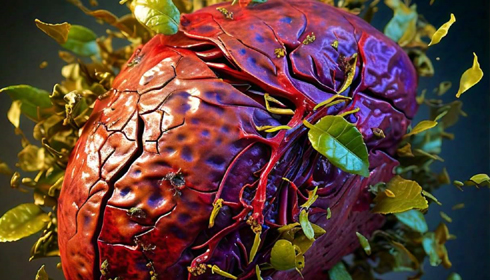
15.6 Million Americans Using Potentially Harmful Herbal Supplements, Including Turmeric & Ashwagandha: Survey
In a survey, Drs. Alisa Likhitsup, Vincent L. Chen, and Robert J. Fontana from the University of Michigan's Department of Internal Medicine highlight a significant public health concern: Within the past 30 days, 4.7% of Americans claimed to have consumed at least one of six possibly hepatotoxic botanical products. The findings of the survey, published in JAMA Network Open recently, project that this amounts to about 15.6 million Americans, or the total number of people taking potentially liver-damaging medications like NSAIDs and simvastatin. Among the supplements noted are turmeric (curcumin), green tea extract, Garcinia cambogia, black cohosh, red yeast rice, and ashwagandha.
Including 9,685 adults with an average age of 47.5 years, 51.8% of whom were female, the study looked at data from the National Health and Nutrition Examination Survey (NHANES) from January 2017 to March 2020. Of the participants, 57.6% said they used health dietary supplements (HDS), while 4.7% said they took one or more of the botanicals mentioned as possibly harmful to the liver.
With 236 users, turmeric was the most often used plant, followed by green tea (92), ashwagandha (28), Garcinia Cambogia (20), red yeast rice (20), and black cohosh (19). Users of these botanicals were generally older, more educated, and more likely than non-users to suffer arthritis, according to the study.
Users of herbal products have shown notable demographic and clinical traits. Generally speaking, they were older—an average age of 51.7 years compared to 41.5 years for non-users. These users were also more likely to be female (56.9% vs. 43.7%), non-Hispanic White (75.2% vs. 54.8%), married (66% vs. 59%), and better educated (82.8% vs. 52.6%). Moreover, they were less likely than 18.3% to be below the poverty line (5.1%).
Compared to non-users, the study indicated botanical users had higher rates of arthritis (40% vs. 19.5%), thyroid illnesses (15.8% vs. 6.8%), and cancer (14% vs. 6.8%). They used prescription medicines much more frequently—66% against 42%.
The findings of this study draw attention to the possible health issues related to the general consumption of primarily unregulated herbal supplements. The Dietary Supplement Health and Education Act of 1994 (DSHEA) classifies HDS as food products rather than disease treatments, resulting in little regulatory control. As a result, the FDA does not demand manufacturers confirm the components in HDS products, which causes significant differences between the actual contents and product labels. Because of variations in soil, atmosphere, and production batches, the active ingredients in herbal supplements are challenging to standardise.
From 7% in 2004–2005 to 20% in 2013–2014, the Drug-Induced Liver Injury Network (DILIN) has noted an increase in liver injury brought on by nutritional supplements and herbs. Common offenders causing liver damage are turmeric, kratom, green tea extract, and Garcinia cambogia. From 12.4% in 1998 to 21.1% in 2007–2015, another study by the Acute Liver Failure Study Group found that the number of liver failure patients brought on by HDS climbed.
Given the increasing consumption of potentially hepatotoxic botanical supplements and their link to liver damage, we urgently need more regulatory monitoring and public awareness. Clinicians should warn patients about the potential side effects of these drugs. Assuring their safety and efficacy is a major public health issue as the number of HDS products in the United States rises from 4,000 in 1993 to over 80,000 by 2022.
The writers of the study note, "This highlights a pressing need for better regulation and monitoring of dietary supplements to protect public health." Closing these gaps will help protect consumers from further harm as the market for these supplements grows.